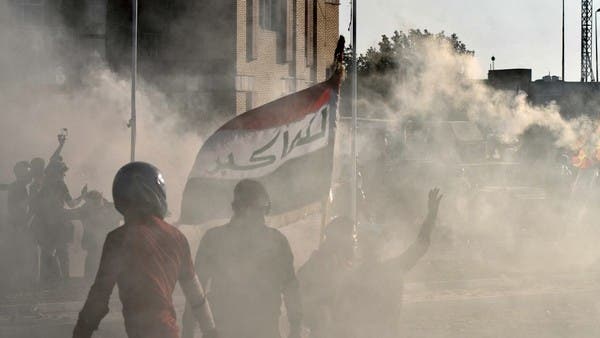The Dhi Qar governorate building in southern Iraq was attacked nightly, and a curfew was put in place. The Iraqi government claimed that 30 “saboteurs” involved in the attacks had been arrested.
Dhi Qar Governor Muhammad Hadi Al-Ghazi announced today, Tuesday, the arrival of security reinforcements to the city of Nasiriyah and the arrest of 30 saboteurs participating in the riots yesterday following an emergency meeting in front of senior security officers.
He said that 20 new arrest warrants had been obtained against additional individuals, and that the arrests concerned 30 people who had been captured in flagrante delicto and had been turned over to the judicial authorities to suffer a just penalty.
In order to thwart any further attempts to undermine security and stability, he also announced that Nasiriyah (the administrative centre of the Dhi Qar governorate) had received additional security force reinforcements.
After setting fire to the governorate office building, Al-Ghazi had earlier declared a curfew throughout the southern governorate. As reported by the official Iraqi News Agency, he emphasised that the situation is under control (INA).
This happened after a “masked group” previously set fire to a portion of the courthouse while “Tishreen Revolutionaries” protesters were leaving.
It is interesting that these disturbances occurred a short time after large-scale protests in Iraq, particularly in Baghdad and some southern cities, on the third anniversary of the so-called “October Revolution,” which started in 2019 and expanded to many parts of the country, particularly the south.
The “October Demonstrations” committee threatened to take “escalatory” action last Saturday and gave the Iraqi political forces until the 25th of this month (October 2022) to stop the political process. They also requested “the installation of an interim transitional administration under UN supervision.”
Since the early parliamentary elections on October 10, 2021, the nation has experienced total political stagnation, which has gotten worse since July 2022 as a result of Muqtada al-Sadr and the Coordinating Framework supporters marching to the streets and staging a sit-in in the heart of Baghdad.
The dispute reached its climax with the Sadrist movement’s demand more than two months ago to dissolve the parliament and hold early legislative elections in order to move the country on the path of reforms in light of its opponents’ rejection of this approach, and their insistence on forming a government with their candidate before any new elections.
30 people died as a result of the conflict’s violent skirmishes between the two sides in central Baghdad in late August 2022, which opened the door for the prospect of a risky re-escalation.

